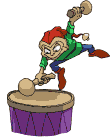 HRH Prince Harry (2/2)
HRH Prince Harry (2/2) 
Harry maintained a low public profile in the months immediately after his mother’s death, choosing to mourn in his own way and his own time. When he did re-emerge on to the public stage, it proved an unsurprisingly poignant moment. Shortly before she was killed, the Princess of Wales had promised him a special half-term treat – a trip to South Africa. Prince Charles, sensitive to what Diana’s promise had meant to their son, honoured both her vow and his wife’s memory by taking Harry on an eight-day tour of the country in October 1997. Although Harry seemed a little pale and understandably fragile, the “private visit” proved something of a tonic. The trip was exactly the kind of educational but fun event that his late mother would have been most in favour of – and it yielded some quite extraordinary moments. Father and son attended a charity concert given by the Spice Girls – not only one of Britain’s biggest musical exports, but also friends of the Prince of Wales – who were in Johannesburg, performing free of charge as a favour to Prince Charles. The group, who are notorious for their refusal to stand on ceremony, made a huge fuss of Prince Harry. Emma Bunton, or “Baby Spice”, held his hand and gave him an affectionate peck on the cheek.
The visit allowed Harry to travel on safari in Botswana with a schoolfriend and Tiggy Legge-Bourke, his former nanny. As if it were not enough to see African wildlife roam the savannah and the Spice Girls in action, the young Prince also enjoyed the immense privilege of meeting Nelson Mandela, the then president of South Africa. All in all, father and son’s tour proved effective: with much of the media attention focused on President Mandela and five young singers from England, Prince Harry found that he was once again ready to venture on to the world stage.
One small benefit of the circumstances of Diana’s death was public pressure for a more humane and responsible attitude among the British tabloid press. Over the next year, the boys’ privacy was widely respected. At the beginning of September 1998, a year after their mother’s death, the boys jointly issued a statement asking both press and public to allow them to get on with their lives by permitting Diana to rest in peace, and giving them the chance to live quietly and away from press scrutiny.
Initially, this did appear to be the case. When Charles and his sons went on a skiing holiday to Canada, the press exercised an admirable degree of self-restraint, allowing the Royal party to enjoy their vacation. Similarly, when Prince Harry demonstrated his contemporary credentials by choosing football over rugby and horse-racing, and accompanying his father to France to support the English national soccer team, press scrutiny was kept to a minimum, never advancing beyond the weighty question of whether or not Harry would patriotically don an English football shirt.
With a familiarly depressing predictability, however, quarters of the British press were quick to issue Harry and his father with sanctimonious reprimands a few months later, following what was, perhaps, a rather ill-advised piece of daredevil abseiling by the young Prince, who has always been fond of such outdoor pursuits.
Harry took the next step in his educational career in September 1998, following his brother to Eton College, one of Britain’s most illustrious and intellectually demanding public schools. Prince Harry soon settled into the routine of life as an Etonian, finding a variety of outlets for his talents, whether academic, sporting, or creative. It was, however, Harry’s keen love of sports that once again brought him the unwelcome attentions of the tabloid press, just two months later. The boy suffered what Prince Charles described in an angry letter to a tabloid, the Daily Mirror, as “very minor bruising” following a slight injury on the playing field. To the British tabloid press, it was a matter of “public interest”. To the Prince of Wales, it was yet another example of unnecessary press intrusion. He admonished the newspaper for the way in which it had “made it very difficult for Prince Harry to have a normal life at school”. Although the paper refused to apologise, the Prince of Wales’s defiant refusal to allow his sons to be treated in the same way they had treated his wife proved something of a landmark.
As Harry approaches his 16th birthday this autumn, he remains relatively shielded from the public eye – unlike William, whom the press appear to be grooming as one of the world’s most eligible bachelors. This leaves the younger brother to enjoy his school years and his pursuit of academic and sporting excellence – although his growing confidence does appear to be helping him to adjust to the limelight. Harry has developed a technique all of his own to dissuade intrusions of his privacy while out in Eton or Windsor. Wearing sunglasses and a baseball cap, he will respond to onlookers who ask him whether he is Prince Harry with the words: “Sorry mate, I’m Bob.” It proves rather effective.
Prince Harry has grown up remarkably quickly in the two years since his mother’s death. The shyness has given way to a growing self-confidence: it was, for instance, Harry’s own decision to be confirmed into the Anglican faith alongside his fellow Etonians. His brother may have been confirmed in a private ceremony taken by the Bishop of London, but Harry wanted to join the school’s service led by the Bishop of Lincoln. His joy too at the attention paid him by the Spice Girls in South Africa, and his admission that he has a preference for blondes, suggest that Prince Harry is rapidly ending boyhood. His maturity, charm and dedication to his Royal duties should ensure that he will be a man to make his parents proud.